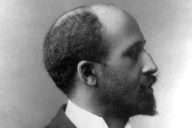As some of you know, the Human Resources department at Rutgers used my Facebook posts of late May and early June to convict me of violating the university’s policy on discrimination and harassment. The associate director at the Office of Employment Equity, wrote the original report. It is so full of speculation, innuendo, conjecture, and unabashed bias that it’s almost laughable, and yet her findings were quickly confirmed by her boss, the VP at HR, a man with a law degree.
During the preliminary “investigative” interview the associate director conducted with me, I asked where the complaints about my Facebook posts came from. She said, without hesitation, that they were entirely anonymous, and that none had come from Rutgers students, staff, or faculty. In her subsequent report, however, she stated that some of these anonymous complaints “could arguably” have come from within the Rutgers community, thereby suggesting that I might have harassed somebody on campus, and could have damaged the reputation of the university by countermanding its stated mission of inclusion and diversity. These mere conjectures—offered without evidence, indeed pressed against the available evidence—became the premises of her finding.
Meanwhile, I had received many informal “complaints” about my Facebook posts. When I spoke with the Associate Director, these numbered over 100. As of now, they total over 300. (The History Department also received a death threat by phone.) With four exceptions, they have come from alt-right sources and white supremacists who use every imaginable epithet, including “nigger lover,” “race traitor,” and “racist fuckstain”—my favorite so far—to condemn my utterance as a betrayal of their race and mine. The HR Associate Director’s finding in effect validated their charge of “reverse racism.” In that sense, or to that extent, the university’s OEE office legitimated the complaints of the alt-right.
Before this conclusion was reached, I had decided to meet with one of these alt-right peronae, presumably a real person who had threatened me with bodily harm. I offered to meet with him at Harlem Shake, a block from where I live, and the scene of my original comments on gentrification. I showed, he didn’t—well, duh—but a camera crew from TV 11, a local news outlet, did, and its tape went viral on YouTube. This episode and subsequent features on MSNBC and NBC fed into the HR report, without my prior knowledge.
Robert Barchi, the president of the university, then stepped in, remanding the HR finding to OEE, demanding a “more rigorous analysis” of the situation, and convening a university-wide committee to supervise future deliberations on faculty violations of university policy on harassment as against their free speech. This committee delivered its advice to the Rutgers Office of Employment Equity, which then rendered a new finding that simply reversed its previous determination, stating that I had not violated any university policy. President Barchi was probably—presumably—influenced in this decision by a letter from the Foundation for Individual Rights in Education (FIRE), which threatened litigation should my First Amendment rights be infringed by the OEE finding and any censure that followed.
I was encouraged by the president’s demand to examine the assumptions of these well-meaning people of liberal principle at Rutgers OEE. They need exposure and criticism, perhaps even ridicule, because they are no different than those which inform the alt-right’s animus against my utterance. These assumptions are: (1) If I say “I hate white people,” and immediately, also satirically, identify myself as a Caucasian (“I am a white people, for God’s sake”), that is the equivalent of saying “I hate black people,” because all races are protected categories under existing civil rights codes, laws, and regulations. (2) This supposed equivalence makes my utterance racist, prima facie, thus subject to disciplinary action by the university, up to and including discharge, regardless of First Amendment protections provided to employees of public universities like Rutgers. (3) “Reverse racism,” that is, bias against white people, however and by whomever expressed, is as damaging to the social fabric and intellectual mission of the university as any other form of discrimination in the workplace and in the larger society.
These assumptions are no different from those that animate the Roberts Supreme Court as it has disarmed the Voting Rights Act of 1965—see Shelby County v. Holder 570 US (2013), and no different from the assumptions that animate the alt-right’s attacks on higher education.
Call this unlikely consensus “liberal racism,” because it presupposes a “color-blind” society as the standard of justice–as if 400 years of slavery, Jim Crow, and systematic discrimination against black people had not created and enforced racial hierarchies that persist to this day. According to this anti-historical logic, any invocation of race, whatever the authorial source or intention, is, ipso facto, evidence of prejudice, bias, and its culmination in what we now call racism—as if the words of a black man always meant as much as those of a white man, in a court of law or anywhere else. As if 400 years of second-class citizenship, or no citizenship at all, can now be ignored by lawmakers and jurists, because to attend to its historical consequences is to foreground race, and thus to distort the meaning of equality at the law, where everybody is supposed to be treated the same.
“The Amendment [the 15th Amendment of 1870, which made freedmen voters] is not designed to punish the past; its purpose is to ensure a better future.” That’s John Roberts getting pious in the Shelby decision, which he wrote for the majority. It is an empty statement, nay more, it is an egregiously racist statement, because it willfully ignores the three hundred prior years of political machination designed to suppress the black vote by defining African Americans as less than human. It willfully ignores the avowed revocation of that past the Amendment intended—its punishment by displacement, if you will. But Roberts gets even more religion later on: “Today, the Nation is no longer divided along those [racial] lines, yet the Voting Rights Act continues to treat it as if it were.”
Hello? Since when are we not divided along those lines? Since when have black people been accorded equality or equity at the law? Since when has mass incarceration not meant more black males in prison? Since when has “stop and frisk” meant round up them white boys because they probably carryin’ something? Since when have black lives mattered?
Put these questions more formally. Is there anybody who doubts that Republican Party claims about voter fraud, and attendant efforts to purge voter rolls via stringent identification criteria, are anything but attempts to suppress minority votes—to silence the black electorate? Oh, please. Only over there at the Supreme Court, haunted but not yet redeemed by Dred Scott, can people answer these questions without embarrassment, indignation, and political animus.
Liberal racism, so conceived, as a color-blind attitude toward everyone and everything, falls into the trap of confusion engendered, in every sense, by the notion, now endorsed by the Roberts Court, that treating everyone as equals at the law will create or enforce equality at the law and in the larger society. It’s a ludicrous notion. If you treat everyone—all persons, natural or corporate—as equally endowed with the resources required to represent themselves in court, or in public discourse, as the Roberts Court did in deciding both Shelby (2013) and Citizens United (2010), you have validated without acknowledging two simple facts: that some (probably white) people have more resources than others, but not because they earned them, and that corporate persons have more resources than any natural person could ever muster. You have validated the obvious, measurable, existing condition of inequality, between black and white, between rich and poor, between males and females.
“Color blindness” is, then, a way of reproducing racial hierarchies, not addressing and changing them. It’s a way of erasing the past, pretending that centuries of perfectly legal oppression have had no effects on the present. Gender neutrality, at the law or anywhere else, is an analogous way of erasing the past, pretending that centuries of perfectly legal male supremacy have had no effects in or on the present. Such pretending, again, merely reproduces the status quo, wherein the “man of reason,” the juror exempt from the vicissitudes of time, still serves as the standard of rationality.
Prejudice and bias can and do lead to genocidal consequences. But racism, historically speaking, is about power, not hatred. Masters did not hate their slaves in the antebellum South; they didn’t much fear them, either, not until Nat Turner and the abolitionists came along in 1831. But slaveholders did think that these servants of theirs were of a different species, and used a primitive version of racial categorization to explain what they couldn’t understand. The racial divide in the South wasn’t officially and systematically policed and enforced by terror and hatred until the advent of the Jim Crow regime in the 1890s—that is, until legalized segregation, lynch law, and political disenfranchisement became the rule, there as elsewhere. Notice that this regime was carefully crafted and meticulously institutionalized: there was nothing informal or unstated about it, except for the exuberance of the mobs that lynched hundreds of black males, men and boys, from 1889 to 1955.
Black people have never been able to impose such power, such terror, on white people—not in North America, anyway. Their utterance about the white majority has never carried the force of law, nor the unspoken approval of popular opinion. No matter how hateful or invective, it hasn’t mattered, except perhaps as an occasion for personal dispute. Instead, and meanwhile, black people have been subject to the most invidious and vicious rhetoric imaginable—which has also and not incidentally been inscribed in the law of the land as interpreted by the Supreme Court after Williams v. Mississippi (1898), the decision that ratified the disenfranchisement of black voters mandated by the 1890 revision of Mississippi’s state constitution.
To accredit the notion of “reverse racism” is, then, to ignore—more, to repress—the history of the country we would like to redeem, as we call it forth from the original sin of slavery. It is to erase the suffering determined by racial vectors of power we wish we could forget, but cannot, at the risk of our very souls.
That sounds melodramatic, I know, so here’s an example culled from the aftermath of the midterm elections. On November 7, 2018, the day after the election, Sheryl Gay Stolberg offered a “news analysis” in the NYT, claiming that Trump’s racially inflammatory rhetoric and agenda have now taken over the Republican Party. But she ended her piece by quoting Jack Kingston, a former Republican Congressman from Georgia, to the effect that Democratic candidates also used racially charged appeals to their base. Stolberg didn’t bother to examine Kingston’s claim, she just presented it. Thus she validated the notion that black candidates and their advocates indulge in “reverse racism”—because any mention of race is inflammatory and potentially discriminatory.
‘“Jack Kingston, a former Republican congressman from Georgia, said Democrats engaged in their own brand of racially tinged politics. He pointed to a speech given by Oprah Winfrey at a town hall for Ms. Abrams in which Ms. Winfrey, harking back to the days when African-Americans did not have the right to vote, told a black crowd that failing to show up at the polls would be “dishonoring your family.”
“Oprah had a very deliberate racial message,” Mr. Kingston said.”’
Now, what was that message? Yes, it was offered to a “black crowd”—the descendants of slaves who had to fight and die in the Civil War to attain first personhood, then citizenship and the right to vote. The racial message was clear: your ancestors sacrificed so that you could exercise this right, so do them proud.
Now invert this message using the moral equivalence Kingston concocted: yes, of course, Republicans appeal to white voters, just like Democrats appeal to black voters. Big deal. Except an appeal to white voters in these times is an endorsement of white supremacy, because, in political context, everybody knows that Republican efforts to suppress voter turnout are aimed at minorities—black people in the South and immigrants everywhere else in context—good God I hate to say that but it’s my obligation as a historian to do so—in context, Kingston’s implicit charge of “reverse racism” is grotesque, at best. And yet it animates the thinking of the alt-right, the people who have threatened my life and my livelihood, the decisions of the Roberts Court, which validate voter suppression by Republican state legislatures, and the determinations of the Office of Employment Equity at Rutgers University, which found me guilty of racial discrimination because I said “I hate white people. And I am a white people, for God’s sake.”
So a postscript seems in order. The Rutgers Police Department and the Newark Star-Ledger have contacted me, to inform me and to seek comment on a flyer that has appeared on the New Brunswick campus. It has a picture of me from the History department website, with quotes from my Facebook posts: “I hate white people,” etc., adding that Rutgers endorses me, somehow. The import of this, I suppose, is to designate me a racist and to condemn the university.
Adam Clark at the Star-Ledger asked me for comment, and here’s what I said:
“I have received roughly 300 emails about my satiric Facebook posts of May 31-June 1, in which I resigned from the white race. Four of them conveyed, shall we say, solidarity. The rest called me a race traitor–at best. I can’t quote them because their ugliness isn’t fit for your pages. All of them came from alt-right, white supremacist, white nationalist sources.
As for the fliers, consider the source. Evropa, an avowed white nationalist organization affiliated, at least, with Storm Front, the new-Nazi website.
You might want to ask why the alt-right and the good liberals at HR agree.”







No Comments